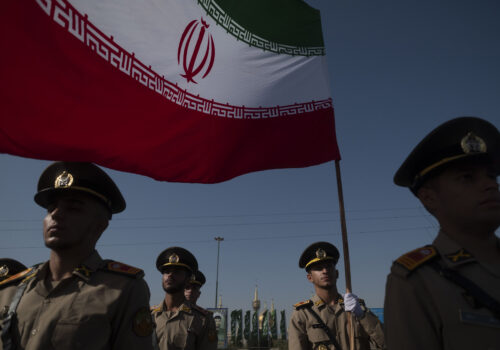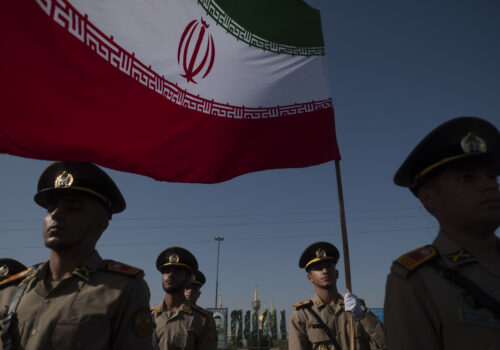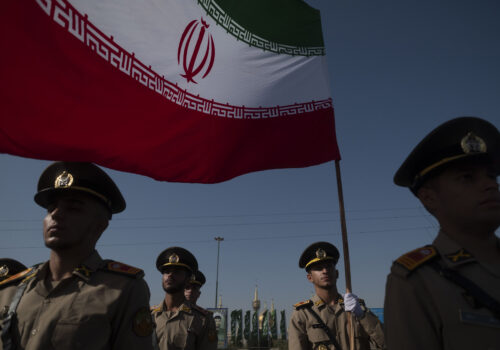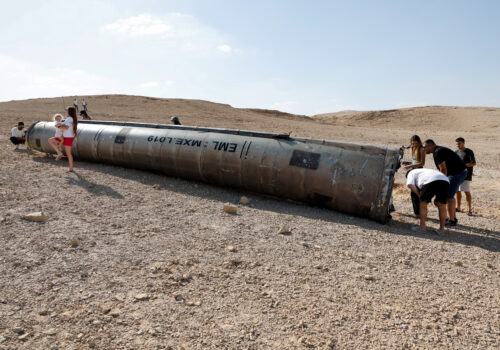
Israel’s dramatic gains on Iran present a historic chance—and enormous risks

History sometimes gets stuck on a bad outcome, without any hope of altering it at acceptable risk and over a reasonable time frame. For more than thirty years, that has been the case with Iran’s destabilization of the Middle East alongside its proxy network, which includes Hezbollah in Lebanon, Hamas in Gaza, and the Houthis in Yemen.
Over the past six weeks, however, a series of setbacks for Iran has put history on fast-forward. One year after Israel absorbed the trauma of Hamas’s terrorist attacks against it on October 7, 2023, it has decapitated Hezbollah in Lebanon, severely weakened Hamas in Gaza (though at a terribly high cost of Palestinian civilian casualties), and weathered a recent barrage of some 180 Iranian ballistic missiles with limited damage.
Now Israel, writes David Ignatius in the Washington Post, has “gained what military strategists call ‘escalation dominance’ over Iran and its proxies: striking its adversaries at will and suffering only minor damage in response.” That being the case, Israeli leaders are asking themselves whether it is the moment not only to press their current advantages within Lebanon, but also to strike a blow against Iran of enduring significance.
This is in the context of a conviction Israeli Prime Minister Benjamin Netanyahu shared with individuals he interacted with during the recent United Nations General Assembly, which they then shared with me. Israeli intelligence is aware, he told them, of an Iranian plan to annihilate Israel by 2040. If not now, Netanyahu seemed to be suggesting to his interlocutors, then when?
Iran’s economy is weak, its ruling ayatollah is aging, the head of its Quds Force may not be alive, and Hezbollah, its insurance policy against Israel, is significantly weakened. Israeli leaders fear this good an opportunity to more seriously degrade Iranian capabilities may not come again if they don’t seize it now.
While US President Joe Biden calls for a proportional response to Iran’s latest effort to strike Israel with ballistic missiles, Netanyahu is instead weighing whether he has a historic opportunity to do much more. The targets he’s likely considering include Iranian oil infrastructure, striking at Iran’s already hobbled economy, or, more significantly, missile factories, which are producing tens of thousands of short-range and long-range ballistic missiles.
The most significant of all Iranian targets, however, would be the hardest to disrupt or destroy: the nuclear infrastructure involved in Tehran’s efforts to produce weapons. Israel knows these targets would be the most difficult to hit, as they are nearly a thousand miles from Israel and hardened to withstand attack. Natanz is buried and protected by reinforced concrete, and Fordow is built into the side of a mountain.
On the other hand, the moment that Iran breaks out as a nuclear weapons power, it will become an even more existential threat to Israel that will be more difficult, and perhaps impossible, to deter. With its defense industrial cooperation rapidly growing with China, Russia, and North Korea, Iran also could join them as a destabilizing nuclear weapons quartet with global ramifications.
Writing for Foreign Policy, under the headline “The Case for Destroying Iran’s Nuclear Program Now,” the Atlantic Council’s Matthew Kroenig argues that Biden should reconsider his opposition to an Israeli strike on Iranian nuclear sites. “Indeed, now is an ideal opportunity to destroy Iran’s nuclear program,” he writes, listing several factors to explain why that’s the case.
First, he argues, Iran’s breakout timeline to one bomb’s worth of weapons-grade material is one to two weeks, so “we are out of time.” Second, its escalating conflict with Israel is likely to accelerate Iran’s weapons development efforts even further. Third, Israel has drastically reduced Hamas’s capabilities and radically diminished Hezbollah’s ability to retaliate, though the extent to which Israel has diminished Hezbollah’s vast missile inventory is unclear. Fourth, there is no prospect on the horizon for a diplomatic solution, a far more desirable but perhaps implausible outcome.
Finally, if the United States agrees that an Iranian nuclear state is an unacceptable risk, which is a consistent and bipartisan conviction, it for the moment lacks any better strategy than to seize upon the opportunity provided by the past month’s reestablishment of Israeli “escalation dominance.”
“The plan appears to be to hope that Iran does not take the final steps to weaponize its advanced nuclear program,” writes Kroenig. “That means that without a major outside intervention, the world is on a path to stand by and watch as Iran becomes a nuclear power.”
Whether Vice President Kamala Harris or former President Donald Trump is elected in four weeks, they will face the growing urgency of dealing with the Iran question that now presents itself. The consequences of a rush to Israeli military action on Iran, which poses a risk of staggering civilian causalities and unpredictable potential for escalation, should incentivize the search for alternatives.
With that in mind, the Atlantic Council has produced an impressive, bipartisan roadmap for the next administration entitled “The future of US strategy toward Iran.”
Says the report: “The advances Tehran is making in its nuclear program, and its spurning of efforts to negotiate a new deal, urgently require a reinvigorated US strategy to prevent Iran from becoming a nuclear-weapons state.” It calls for a “multilateral campaign of economic, political, and military pressure to demonstrate US seriousness about preventing Iran from crossing the nuclear-weapons threshold.”
In one of the report’s more powerful paragraphs, it argues, “The United States needs to maintain a declaratory policy, explicitly enunciated by the president, that it will not tolerate Iran getting a nuclear weapon and will use military force to prevent this development if all other measures fail. To support this policy, the United States should refrain from stressing that it does not seek conflict with Iran; announce that it will conduct yearly joint exercises with Israel, such as Juniper Oak; and seek additional funding in the next budget cycle to speed research and development of next-generation military hardware capable of destroying Iran’s nuclear program.”
The question is whether Israel’s sense of historic moment will provide the patience to wait for the next US budget cycle. And if not, what is Israel capable of militarily on its own, and what would the US approach be should Israel decide to press its advantage?
The eighty-five-page report is an ambitious and welcome effort, as Iran Strategy Project Director Jonathan Panikoff writes in the foreword, to provide the next US president with “a strategic, holistic, and bipartisan US strategy toward Iran.”
The report was written by both Republicans and Democrats, and the bipartisan nature of its recommendations is an impressive feat in a Washington bereft of such examples. It is also a precondition for a lasting approach to Iran. The last decade of US policy toward Iran has been characterized by partisan policy swings from the Obama administration’s focus on negotiations with Iran, to the Trump administration’s “maximum pressure” campaign, and then to the Biden administration’s failed attempt to return to nuclear negotiations, followed by policy drift. That inconsistency has confused partners and provided space for Iran to advance its malign regional influence and nuclear ambitions. A strategy that outlasts more than one administration is now more crucial than ever.
Even as the two dozen individuals involved in the report were finalizing it, they knew that unfolding events in the Middle East might accelerate the timeline for dealing with Iran. But they also recognized that no matter Israel’s tactical success in retaliating for Iran’s early October strikes, a holistic strategy would still be needed to address the nuclear challenge that Iran poses, as well as its regional malign influence, hostage-taking, and global assassination campaigns.
For the United States as well, a long-term strategy is required to ensure Hezbollah is permanently diminished—not temporarily, as it was after the 2006 war—so that this episode does not simply repeat in a decade. In addition, a US strategy should focus on restoring deterrence against Iran and its proxies not only by Israel, but also by the United States by responding to every attack, and on making sure that global commerce isn’t permanently held hostage by the Houthis as they attack vessels in the Red Sea.
History has come unstuck regarding Iran’s future ability to destabilize the Middle East. The risks of taking on Iran’s nuclear capability are enormous and difficult to predict. However, the risks of passing up this chance to contain Iran militarily and put its nuclear aspirations into reverse are predictable and, perhaps, even greater.
Is the greater risk being too early or too late in frustrating Iran’s nuclear weapons ambitions? In Israel, the answer is obvious and existential. For the United States, domestic electoral priorities are clouding the urgency of this consequential moment with Iran, but that doesn’t change its undeniable reality.
Frederick Kempe is president and chief executive officer of the Atlantic Council. You can follow him on X: @FredKempe.
This edition is part of Frederick Kempe’s Inflection Points newsletter, a column of dispatches from a world in transition. To receive this newsletter throughout the week, sign up here.
Further reading
Wed, Oct 2, 2024
Iran has a strategy for Israel. Now Israel needs one for Iran.
IranSource By Alan Pino
Israel needs a long-term plan that can secure regional cooperation, rehabilitate its international image, maintain the support of the United States, and give the Israeli people hope of a future without endless war.
Thu, Oct 3, 2024
How American diplomacy can stabilize Lebanon—and the Middle East
New Atlanticist By Daniel E. Mouton
As Israeli military operations focus on clearing Hezbollah fighters and weapons in southern Lebanon and Iran weighs additional attacks, US diplomacy must work to define the end point for the current escalation.
Fri, Oct 4, 2024
One year after Hamas’s October 7 terrorist attacks, here’s how the region has changed
MENASource By Atlantic Council experts
A year into the Gaza war, the conflict has left deep political, security, and societal scars across the Middle East and North Africa. The war was ignited by an unprecedented terrorist attack by Hamas on Israel on October 7, 2023 in which militants killed some 1,200 people and took 251 hostages—97 of whom are still […]
Image: Israel Defense Minister Yoav Gallant (left) and Israel Chief of Staff Lieutenant General Herzi Halevi (middle) command the New Order operation to kill the Hezbollah leader, Hassan Nasrallah, in the Air Force pit with members of the General Staff Forum on Sept 27, 2024.





